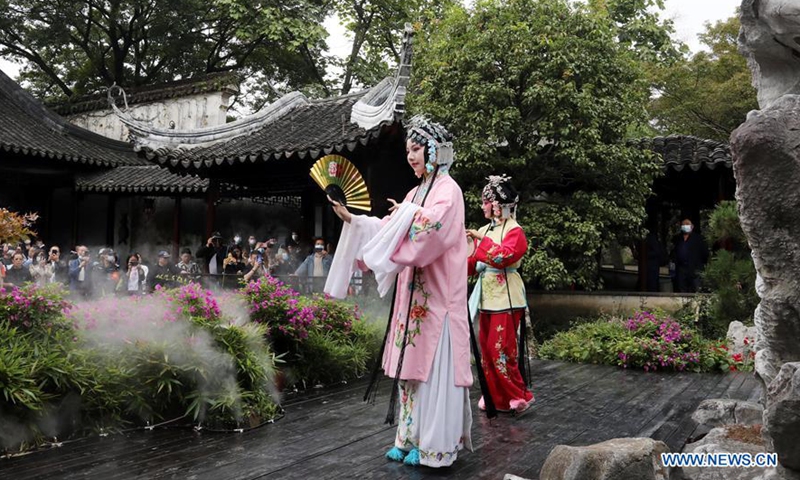ARTS / ART
China’s first-ever 8K Kunqu Opera film screened in Shanghai

Actresses perform Chinese Kunqu masterpiece "The Peony Pavilion" at the Lingering Garden in Suzhou, east China's Jiangsu Province, Oct. 7, 2020. Written by Chinese playwright Tang Xianzu (1550-1616) of the Ming Dynasty (1368-1644), it tells the story of the romance between a daughter of a wealthy official and a talented but poor young scholar. The play has been staged overseas many times. Kunqu, with a history of hundreds of years, is listed by the United Nations Educational, Scientific and Cultural Organization (UNESCO) as an intangible cultural heritage. (Photo by Hang Xingwei/Xinhua)
China’s first-ever 8K panoramic sound Kunqu Opera film The Handan Dream was screened in Shanghai on Tuesday as part of efforts to preserve the country’s 600-year-old intangible cultural heritage.
The Handan Dream is a celebrated Kunqu Opera masterpiece, one of the four literary masterpieces written by Chinese playwright Tang Xianzu in the Ming Dynasty (1368-1644), telling the tale of the scholar Lu Sheng, who encounters an immortal, Lü Dongbin, and experiences 50 years of a high official’s life in a dream.
This cinematic undertaking began production in April 2021, coinciding with the 20th anniversary of Kunqu Opera’s UNESCO recognition and the 100th anniversary of the Kunqu Teaching and Learning Institute. The film is set to grace screens across the country by the end of the year.
“Bringing The Handan Dream from the stage to the silver screen, and passing on the legacy of Kunqu Opera in this way is truly a heartwarming achievement,” said lead actress Liang Guyin at the premiere.
During filming, three veteran Kunqu artists – Ji Zhenhua, Liang Guyin and Zhang Mingrong – dedicated themselves to continuous vocal and physical training, eschewing the use of body doubles.
The demands of 8K technology in terms of clarity and color depth raised new challenges for makeup, costumes, and post-production. The technical team spent over half a year creating special effects for the film, with AI technology also used in the film.
Gu Haohao, director of Shanghai Kunqu Opera Troupe and the executive producer of film, said that many viewers have said that watching the performances of seasoned artists was especially gratifying, which made the team feel the past three years were all worth it.
“I believe this film will be an invaluable resource in many years to come, both for the present and the future,” she added.
According to Gu, the Shanghai Kunqu Opera Troupe plans to produce film adaptations of all four plays in the Four Dreams of Linchuan series by Tang Xianzu, featuring both veteran and young actors. “We will improve and enhance our productions based on feedback and continue preserving classic works in this cinematic format, which is an excellent means of promoting and preserving the heritage of Kunqu opera,” she noted.
In late October, The Handan Dream will be showcased at the 36th Tokyo International Film Festival and the 19th Chinese American Film Festival.
Originating in Kunshan, East China’s Jiangsu Province, Kunqu Opera is one of the oldest forms of opera still existing in China, with its origins dating back to the Song dynasty (960-1279). In 2001, it was listed as one of the Masterpieces of the Oral and Intangible Cultural Heritage of Humanity by UNESCO, the first item of Chinese cultural heritage to gain such recognition.
